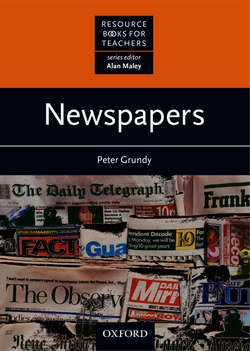Читать книгу Newspapers - Peter Grundy - Страница 4
Foreword
ОглавлениеNewspapers have long provided a valuable resource for language teachers and learners alike. So much so that many published courses use real or simulated newspaper articles, and most schools (and many teachers) maintain files of articles organized thematically or on the basis of their language content. (And which of us has not been rescued from lack of preparation by the providential article culled fresh from the morning newspaper?)
Language learners find newspapers motivating because they offer interesting, relevant, topical, and varied information. Equally importantly, for many, they provide one of the more obvious keys for opening up the foreign society, its preoccupations, its habitual ways of thought, and its prejudices. For these very reasons newspaper material is among the most challenging the learner is called upon to face.
Language teachers tend to use newspapers in three ways: to develop various language competencies, including reading comprehension and grammar/vocabulary work; to focus on aspects of the target society and its culture; and to stimulate discussion of issues raised by the articles.
This book, while not neglecting any of these areas, concentrates on developing an authentic response from the learners. The activities are aimed at helping learners to read newspapers as newspapers, and to react to them as real people. (See especially Chapter 6, ‘Personal responses’.) All too often the newspaper article has been treated as an object for linguistic or cultural dissection and analysis. Such practices can lead to the teacher continuing to squeeze the text dry long after the sap of genuine interest has been savoured by the learners.
One of the major problems in incorporating newspaper material in books is loss of topicality. An ephemeral medium is frozen into a kind of permanence, and is rapidly perceived as dated. This book has relatively few re-printed articles. Instead it offers a very wide range of highly creative and original activities which could be applied to almost any article or extract. In this way, it provides teachers with a valuable resource for using the articles of their own choice.
Alan Maley
